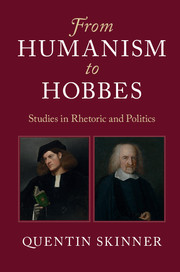Book contents
- Frontmatter
- Contents
- List of Illustrations
- Acknowledgements
- Conventions
- 1 Introduction
- 2 Classical Rhetoric and the Personation of the State
- 3 Machiavelli on Misunderstanding Princely Virtù
- 4 Judicial Rhetoric in The Merchant of Venice
- 5 Rhetorical Redescription and its Uses in Shakespeare
- 6 The Generation of John Milton at Cambridge
- 7 Rethinking Liberty in the English Revolution
- 8 Hobbes on Civil Conversation
- 9 Hobbes on Political Representation
- 10 Hobbes and the Humanist Frontispiece
- 11 Hobbes on Hereditary Right
- 12 Hobbes and the Concept of the State
- Bibliography
- Index
4 - Judicial Rhetoric in The Merchant of Venice
Published online by Cambridge University Press: 16 January 2018
- Frontmatter
- Contents
- List of Illustrations
- Acknowledgements
- Conventions
- 1 Introduction
- 2 Classical Rhetoric and the Personation of the State
- 3 Machiavelli on Misunderstanding Princely Virtù
- 4 Judicial Rhetoric in The Merchant of Venice
- 5 Rhetorical Redescription and its Uses in Shakespeare
- 6 The Generation of John Milton at Cambridge
- 7 Rethinking Liberty in the English Revolution
- 8 Hobbes on Civil Conversation
- 9 Hobbes on Political Representation
- 10 Hobbes and the Humanist Frontispiece
- 11 Hobbes on Hereditary Right
- 12 Hobbes and the Concept of the State
- Bibliography
- Index
Summary
My aim is to explore a new approach to some familiar questions about the trial scene in The Merchant of Venice. What are the intellectual materials out of which the scene is constructed? Can we hope to identify the sources of Shakespeare's technical vocabulary and legal arguments? Until recently, two related answers dominated the critical literature. One claimed that the trial scene ‘symbolises the confrontation of Judaism and Christianity as theological systems’ and ‘develops the sharpest opposition of Old Law and New in terms of their respective theological principles, Justice and Mercy’. Among the many commentators who adopted this perspective, some took the main allegorical contrast to be between Shylocke and Anthonio, with Anthonio standing for charity and love by contrast with Shylocke's demand for strict justice. But most preferred to see in Portia the emblematic figure who calls for ‘the reconciliation of Justice and Mercy’ and represents the view that ‘the New Law takes precedence over the Old’.
The other and more specific claim I wish to reconsider was frequently allied with this approach. The trial was also taken to reflect the belief, increasingly widespread in Elizabethan England, that the most effective means of arriving at a merciful rather than an unduly rigorous verdict is to apply the principles of equitable jurisdiction in place of the stricter demand for justice embodied in common law. Seen from this perspective, the trial came to be viewed as a dramatisation of ‘the conflict between the two systems of law’, with Portia ‘adopting precisely the attitude of the Court of Chancery of the period’.
These arguments undoubtedly capture something of importance about the structure of the trial scene. As a number of critics have recently pointed out, however, they both run into difficulties. One problem arises in connection with the alleged symbolic contrast between Shylocke and Anthonio. If the former is a representative of the Old Law, he must be presumed to have some acquaintance with the relevant books of the Old Testament. But these contain repeated calls for justice to be tempered with mercy, and in the book of Micah we are even rhetorically asked ‘what doth the Lord require of thee, but to do justly, and to love mercy, and to walk humbly with thy God?’ A further problem is that it is hard to see in Anthonio a proponent of love and charity by contrast with Shylocke.
- Type
- Chapter
- Information
- From Humanism to HobbesStudies in Rhetoric and Politics, pp. 63 - 88Publisher: Cambridge University PressPrint publication year: 2018



